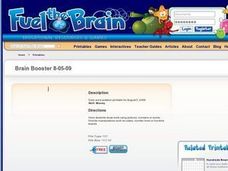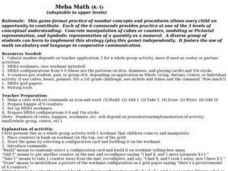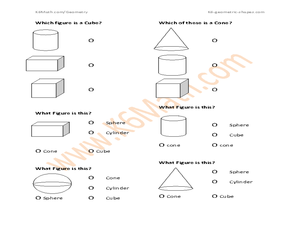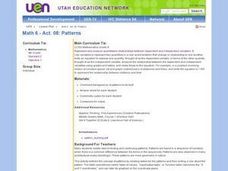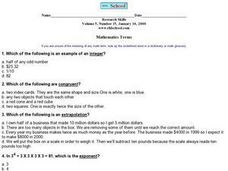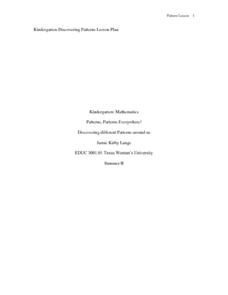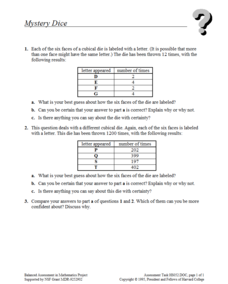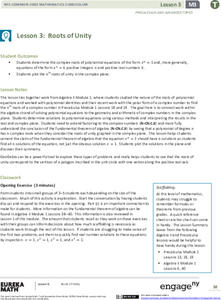Del Mar College
Exponential and Radical Rules
So many rules and so little time. Make it easy and provide all the exponent and radical rules in one place as an easy reference guide. All of the properties come with several examples to show how the rules apply to different problems.
Del Mar College
Quick Reference Card
A neat and organized formula handout makes the circle go round, doesn't it? Full of higher algebra topics, formulas and rules, graphs and definitions—there is a way to support everyone in Algebra II or Pre-Calculus.
Curated OER
Understand Categories of Shapes
This colorful set of shapes and figures is the data set learners need to fill out an extensive table. For each of 11 types of shapes or figures they record the quantity and how many corners and sides each has. This becomes more difficult...
Wake Forest University
Authentic Activities for Connecting Mathematics to the Real World
Check out the handout from a presentation that contains a collection of high school algebra projects connecting a variety of mathematics to the real world. Activities range from simple probabilities to calculus. The activities can be...
Curated OER
Relative Position Step-by-Step Lesson
Kindergartners demonstrate their ability to describe the relative positions of two objects. The two problems at the top of the worksheet are followed by written and illustrated explanations of the meanings of inside and “outside.”
Curated OER
Three-Digit Addition
Students work with hundreds place value, create and manipulate three-digit addition problems, and add three-digit numbers.
Fuel the Brain
How Much Did They Spend?
Young learners do basic addition (with numbers between 50 and 323), to solve two short word problems. This is a great activity to start the day, or consider using this as a type of summative assessment.
Curated OER
Counting by Groups of Ten, Number Line
Have your youngsters test out their abilities using a number line. Students will add to the number line by increments of ten until the solution is found!
Curated OER
Meba Math (K-1)
Young scholars work with counters and math mats to demonstrate number concepts. In this number concept lesson, students use cubes and configuration cards to show more or less than given numbers.
Curated OER
Area, Perimeter and Volume
In this area, perimeter and volume worksheet, students solve and complete 12 various types of problems. First, they calculate the value for each variable in the triangle shown. Then, students find the distance of the ladder against a...
Curated OER
Volume and Surface Area
In this volume and surface area instructional activity, students find the volume in each of the ten problems listed and write their measurements in terms of the larger amount. They find the volume of a sphere, a rectangular solid, and a...
Curated OER
Geometry Skills
In this geometry skills worksheet, students examine 6 geometric figures and identify them as spheres, cylinders, cones, or cubes.
Curated OER
Geometry Skills 2
In this geometry skills worksheet, students examine 6 geometric figures and identify them as spheres, cylinders, cones, or cubes.
Curated OER
Easy Worksheet: Simplifying Radical Expressions
In this simplifying radical expressions activity, learners solve 6 short answer problems. Students simplify radical expressions involving cube and fifth roots of monomials, binomials, and trinomials.
Curated OER
Cube-It Conceptual Art
In this cube-it activity, 6th graders solve and complete 3 different types of problems. First, they start with a cube and build a step-back skyscraper with a given base. Then, students build four-sided pyramids with cubes. They also...
Curated OER
Math 6 - Act. 08: Patterns
Sixth graders use centimeter cubes to build structures and then compare and contrast the patterns they see.
Curated OER
Math Terms- Congruent, Integer, Extrapolation, Exponent
In this math terms worksheet, students answer 4 multiple choice questions about the meaning of congruent, extrapolation, exponents, and integers.
Curated OER
Nets and Surface Area - Mental Math
For this mental math worksheet, students use mental math to find the surface area and determine nets of the given shape. They use an information sheet as an aide to find the answer to 30 questions.
Texas Woman’s University
Patterns, Patterns Everywhere!
Not only is pattern recognition an essential skill for young children to develop, it's also a lot of fun to teach! Over the course of this lesson, class members participate in shared readings, perform small group activities, and complete...
Balanced Assessment
Genetic Codes
Determine the number of possible genetic codes. Class members are challenged to determine the number of possibilities of a genetic code that is 20 bases long. They continue to explore the average lengths of broken RNA molecules.
Concord Consortium
Mystery Dice
Dice aren't typically mysterious devices, but these dice are anything but typical. Scholars try to come up with dice that match given information on the relative frequency when they roll them a certain number of times. They must then...
EngageNY
The Binomial Theorem
Investigate patterns in the binomial theorem. Pupils begin by reviewing the coefficients from Pascal's triangle. They look at the individual terms, the sums of the coefficients on a row, and the alternating sum of each row. Individuals...
EngageNY
Roots of Unity
Visualize the nth roots of unity. Pupils calculate the nth roots of unity and find all n roots. Learners plot the solutions in the complex plane and observe that they are the vertices of a regular n-gon inscribed in the unit circle....
Curated OER
Find It!
Students consturct cube trains and use them to measure the length of selected objects in their classroom. They first "guess" with their eyes and then hold up a cube to check their guess.








